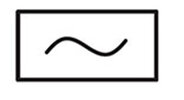- Joined
- 27 Jan 2008
- Messages
- 23,691
- Reaction score
- 2,670
- Location
- Llanfair Caereinion, Nr Welshpool
- Country

I have not got the latest edition of BS 7671, since not retrospective it did not really matter, however my RCBO's all have this logo
 showing them as being type AC, but the boxes they came in clearly showed as being type B which I thought at the time was very good, didn't know you could get single width RCBO's as type B, clearly they were really curve B type AC but that was not what it said on the box.
showing them as being type AC, but the boxes they came in clearly showed as being type B which I thought at the time was very good, didn't know you could get single width RCBO's as type B, clearly they were really curve B type AC but that was not what it said on the box.
I was not really worried, had I realised at the time I would have paid extra for type A, but type A are only good to 6 mA so unless one has a RDC rather pointless anyway.
However now having solar panels fitted, with a battery, and the UPS option, so what needs to change, will I need an earth rod for the UPS option, and will I need type A RCBO's? My copy of BS 7671 is 2008, so not really any help, I have no idea how the system disconnects with a power cut from the DNO supply, and if an earth rod is required, and since during a power cut it will all be supplied from the inverter if the RCBO's all need changing.
Would be nice to know before it is installed, so I can ensure it all complies.
 showing them as being type AC, but the boxes they came in clearly showed as being type B which I thought at the time was very good, didn't know you could get single width RCBO's as type B, clearly they were really curve B type AC but that was not what it said on the box.
showing them as being type AC, but the boxes they came in clearly showed as being type B which I thought at the time was very good, didn't know you could get single width RCBO's as type B, clearly they were really curve B type AC but that was not what it said on the box.I was not really worried, had I realised at the time I would have paid extra for type A, but type A are only good to 6 mA so unless one has a RDC rather pointless anyway.
However now having solar panels fitted, with a battery, and the UPS option, so what needs to change, will I need an earth rod for the UPS option, and will I need type A RCBO's? My copy of BS 7671 is 2008, so not really any help, I have no idea how the system disconnects with a power cut from the DNO supply, and if an earth rod is required, and since during a power cut it will all be supplied from the inverter if the RCBO's all need changing.
Would be nice to know before it is installed, so I can ensure it all complies.

